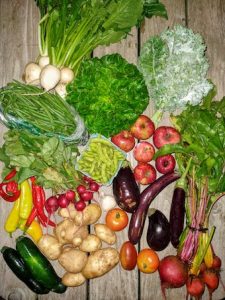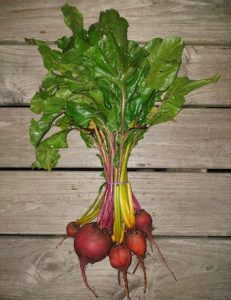
“Do not fear mistakes. You will know failure. Continue to reach out.”
~Benjamin Franklin~
- Potatoes – All Shares
- Garlic – All Shares
- Hot Peppers – All Shares
- Beets – All Shares
- Turnips – All Shares
- Kale – All Shares
- Lettuce – All Shares
- Edamame – Half Shares
- Tomatoes – Flex Shares
- Apples – Full Shares
- Zucchini – Full Shares
- Green Beans – Full and Flex Shares
- Radishes – Full and Flex Shares
- Eggplant – Full and Half Shares
Farmer Notes
Beets are a crop that few people have never heard of and are common here in the United States. The ancestor of the commercialized beet – like the ones you received in your box – are thought to have originated during prehistoric times in North Africa and could be found growing along both Asian and European shorelines. Before they were cultivated, people only ate the leafy greens. The Romans were some of the first to grow them for their roots and later invading peoples were responsible for spreading them throughout Europe. During the 19th century they were noted for their concentrated sugar content and the first sugar factory to process beets was built in Poland. During a time when sugar cane access was restricted by the British, Napoleon ordered that the beet be used as the primary source of sugar, solidifying its well-known status.
Tasty juiced, baked, or plain raw, the beet is a powerhouse of vitamins and minerals. They are high in copper and manganese, while promoting kidney health and delivering both antioxidant and anti-inflammatory benefits. They have even been studied to help protect against heart disease, birth defects, and certain cancers, especially colon cancer.
Some recipes to try:
[ultimate-recipe id=”7290″ template=”default”]
[ultimate-recipe id=”7008″ template=”default”]
[ultimate-recipe id=”6958″ template=”default”]



